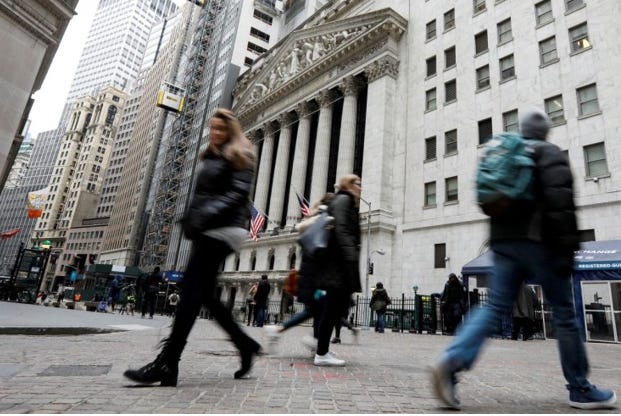Wall Street Could be Heading To A Black Swan Event
Tuttle Ventures LLC featured in The International Business Times
Dear optimist, pessimist and realist; while you were arguing about that glass of water being half full, I drank it.
Sincerely, Opportunist
Tuttle Ventures LLC was recently featured in The International Business Times Inc., the article is titled "Wall Street Could be Heading To A Black Swan Event".
Most of my comments were taken directly from my Substack post—Bonds Never Lie.
If there is one key takeaway here it’s don’t forget to look for opportunities that life gives you.
Full link to the IBT article below:
https://www.ibtimes.com/wall-street-could-heading-black-swan-event-3622230
Wall Street Could Be Heading To A Black Swan Event
Anytime the Fed raises interest rates aggressively, it provokes a Black Swan event like the Asian crises in the 1990s and the Lehman Collapse in 2008. They all took Wall Street another leg down.
James E Demmert, the Managing Partner of Main Street Research, sees the possibility of Wall Street heading in this direction. "Central banks usually raise interest rates until they 'break something,' I would suggest this time is possibly a more difficult period," he told International Business Times in an email. "That's because almost all central banks across the globe are in a rate hiking cycle - given inflation rates."
Demmert points to the U.K. markets, which came close to the breaking point from rising interest rates last month. They forced the Bank of England to step back into the credit markets to add liquidity. "This should be a warning to all investors that the combination of rising rates and the central banks' purposeful mission to contract economies is a danger for financial markets," he added.
If one of the world's central banks ends up "breaking things," Demmert expects global equity prices to take another leg down somewhere between another 10-20%. It would bring the total bear market declines in the 35-45% range, typical for recessionary bear markets.
What would central banks break this time around that could cause a Black Swan event? How bad would it be? It's hard to say.
Black swans are low probability high impact events that are hard to predict, as can show up in different segments of the global financial markets. Thus, generating the correct probability distribution and calculating the expected value of losses is hard.
But that hasn't stopped experts from trying to identify some areas of financial markets prime for a Black Swan event. For instance, Darin Tuttle, CFA Founder & CIO at Tuttle Ventures, looks into the debt market, where rising interest rates and deteriorating credit quality could cause defaults.
But he thinks the subsequent major default will be Sovereign, not Corporate. "We believe the next major default will be sovereign, not corporate, based on the deteriorating credit quality of countries holding foreign debt, political posturing, and elevated geopolitical risks," he told IBT. "Deteriorating credit quality Sovereign defaults occur alongside recessions, banking crises, currency crises, and other severe shocks."
Matthew Grishman, Principal & Wealth Advisor Gebhardt Group, Inc., thinks that financial markets are already in a Black Swan event caused by the Covid pandemic. "The pandemic caused the Fed to take drastic monetary easing policy," said IBT in an email. "It also caused our federal government, through the executive and legislative branches of government, to take drastic fiscal easing policies (financial stimulus)."
Grishman further argues that Black swan events generally occur when no one expects or looks for them. While he sees the possibility of the Fed's tightening causing a super-rare market or economic circumstance, he says that we won't know it happened until after the fact. "You can be prepared in advance," he adds. "I like to call this planning "lifeboat drills," and we do this religiously with our private clients."
Don’t forget to follow Tuttle Ventures on Twitter, LinkedIn or Instagram.
Check out the website or some other work here.
Best,
Darin Tuttle, CFA
NOTE - This is not investment advice. Do your own due diligence. I make no representation, warranty or undertaking, express or implied, as to the accuracy, reliability, completeness, or reasonableness of the information contained in this report. Any assumptions, opinions and estimates expressed in this report constitute my judgment as of the date thereof and is subject to change without notice. Any projections contained in the report are based on a number of assumptions as to market conditions. There is no guarantee that projected outcomes will be achieved. Unless there is a signed Investment Management or Financial Planning Agreement by both parties, Tuttle Ventures is not acting as your financial advisor or in any fiduciary capacity.





Ack, yes. It feels like this current situation is "paying the piper" for the historic (and in my opinion, necessary) fiscal and monetary stimulus from covid. What I think people take for granted is that if the Fed and the US government had done what they did during the Great Depression, which was to contract rather than expand, then the situation today could be completely different 2.5 years out from covid shutdown. Instead of full employment and high inflation, we could've been in an extremely dire situation with mass poverty and hunger!
In a less-extreme example, we could've also repeated the Obama admin mistake of simply not stimulating enough, thus leading to a protracted recovery.
I think the Fed certainly could've started acting last year around this time, and missed some early cues to reverse course. But relative to the above two mistakes, this is actually my preferred scenario. Well, for now - ask me again in a year or two 😆
Also in the Fed's defense, they didn't have any way of knowing Russia would attack in Feb, sending food and energy spiraling and exacerbating an already-difficult macro backdrop...